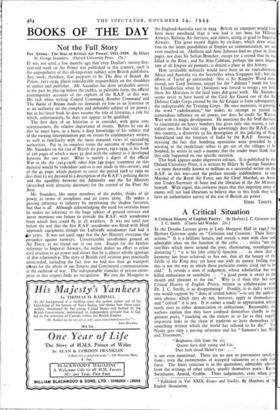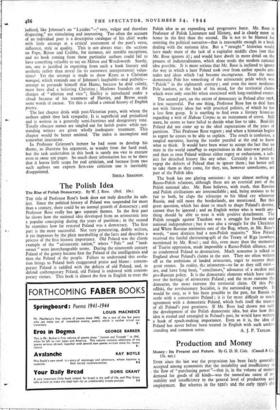A Critical Situation
IN the Deneke Lecture given at Lady Margaret Hall in 1941,* Sir Herbert Grierson spoke on " Criticism and Creation: Their Inter- actions." It is a brilliant lecture, and reveals a man with clear and admirable ideas on the function of the critic . . . critics "are the satellites Which move around the poet, illuminating, transfiguring, distorting "; " it is his [the critic's] function . . . to show that a harmony has been achieved, or has not, that all the beauty of the Idylls of the King may yet leave one with an uneasy feeling that this is not the way in which these particular stories cried out to be told." It reveals a man of judgement, whose scholarship has not killed enthusiasm or sensibility . . . " a good poem is sweet in the mouth and pleasant to the ear." Why is it then that his new Critical History of English Poetry, written in collaboration with Dr. J. C. Smith, is so disappointing? Frankly, it is dull ; written one would suppose by " dons of settled habits "—to use the authors own phrase, which they do not, however, apply to themselves— and " Critical " it is not. It is rather a study in appreciation which rarely rises to either denunciation or enthusiasm. Reasonably, the authors explain that they have confined themselves chiefly to the greatest poets, " touching on the minors in so far as they supply important links in the chain of tradition or have themselves left something written which the world has refused to let die." Yet Nashe gets only a passing reference and his " Summer's last Will and Testament,"
" Brightness falls from the air; Queens have died young and fair; Dust hath closed Helen's eye : . . ."
is not even mentioned. There are no new or provocative revalua tions ; even the restatements of accepted valuations as a rule lack force. The finest criticism is in the quotations, admirably chose from the writings of other critics, usually themselves poets: Kea Swinburne, Arnold, Crabbe. Their judgements, even when pre * Published in Vol. XXIX. Essays and Studies. By Members of th English Association.
judiced, like Johnson's on " Lycidas easy, vulgar and therefore
disgusting," are stimulating and interesting. Too often the account
of an individual poet is a descriptive catalogue of his chief works with little attempt at a critical assessment of the poet's verse, influence, style or quality. This is not always true: the sections
on Pope, Byron and Crabbe, for instance, are notable exceptions, and no book coming from these particular authors could fail to have something valuable to say on Milton and Wordsworth Surely, too, one is justified in expecting from such a book literary and aesthetic rather than moral (in its narrowest interpretation) valua- tions? Yet the attempt is made to show Keats as a Christian manque, which reminds one of Johnson's laughable—and pathetic— attempt to persuade himself that Hume, because he died calmly, must have died a believing Christian ; Marlowe founders on the charges of " atheism and vice"; Shelley is introduced under a cloud because of his treatment of Harriet, and Byron needs some words of excuse. Yet this is called a critical history of English poetry.
The last chapter deals with post-Victorian poets, with whom the authors admit they lack sympathy. It is superficial and prejudiced and is written in a generally semi-facetious and denigratory tone. Totally obscure names are singled out for lavish praise while out- standing writers are given wholly inadequate treatment. This chapter would be better omitted. The index is incomplete and somewhat inaccurate.
In Professor Grierson's lecture he had room to develop his theme, to illustrate his argument, to wander from the hard road, but the task undertaken in this book is surely too vast to execute even in some 50o pages. So much sheer information has to be there that it leaves little scope for real criticism, and because from two such authors one expects first-rate criticism one is inevitably disappointed.
SHEILA SHANNON.



























 Previous page
Previous page